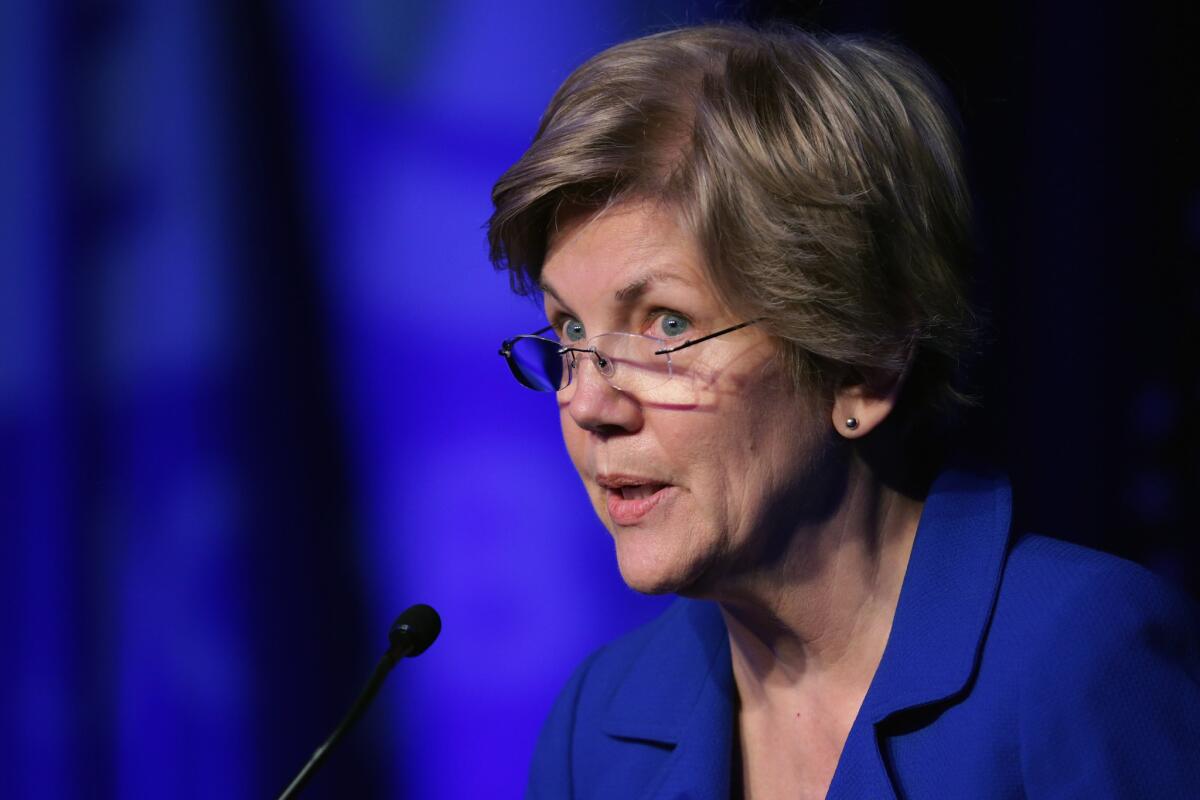Six U.S. senators oppose Comcast-Time Warner Cable merger

Sen. Elizabeth Warren (D-Mass.) and five other U.S. senators have urged the Federal Communications Commission and
- Share via
Political pressure continues to build for federal regulators to block Comcast Corp.’s proposed $45-billion takeover of Time Warner Cable.
Half a dozen U.S. senators -- including Democrats Al Franken of Minnesota, Elizabeth Warren of Massachusetts and Ron Wyden of Oregon -- sent a letter Tuesday to Atty. Gen. Eric H. Holder Jr. and Federal Communications Commission Chairman Tom Wheeler, urging them to deny the merger of the nation’s two largest cable providers.
“We believe that Comcast-TWC’s unmatched power in the telecommunications industry would lead to higher prices, fewer choices, and poorer quality services for Americans,” the six senators wrote.
The high-level letter comes as Comcast’s proposed transaction faces an increasingly uncertain path in Washington. Late last week, Bloomberg News reported that staff attorneys in the U.S. Department of Justice, which Holder oversees, were nearing a recommendation to deny the blockbuster merger.
FCC and Justice Department representatives declined to comment.
The companies are dispatching their legal teams to meet with Justice Department attorneys on Wednesday. The two sides are expected to discuss the agency’s reported concerns about the proposed combination.
The meeting signals that federal regulators might be nearing the final stretch of their review, which was launched nearly a year ago.
A decision is not expected this week, however.
Nonetheless, lawmakers are stepping up the pressure.
In addition to Warren, Wyden and Franken, the other senators who signed the letter were Bernie Sanders (I-Vt.), Edward J. Markey (D-Mass.) and Richard Blumenthal (D-Conn.).
------------
FOR THE RECORD
An earlier version of this post referred to Sen. Bernie Sanders of Vermont as a Democrat. He is an independent.
------------
In their letter to Wheeler and Holder, the six senators said Comcast was in a unique position. Comcast has an extensive distribution system, and four years ago the company acquired NBCUniversal, which has nearly a dozen cable channels, the NBC broadcast network and Universal Pictures.
Such assets could allow Comcast to control the prices set by programmers, the senators argued.
“The concerns about the transaction center on the undeniable reality that the combined Comcast-TWC would be the overwhelmingly dominant cable and broadband Internet provider in the nation and control much of the programming that Americans watch,” the letter said.
Comcast, in a statement, took issue with several of the senators’ characterizations. The company asserted that the deal should lead to cost savings and other benefits for consumers.
“The benefits of the Comcast TWC deal are demonstrated and real: A better video experience -- Comcast has twice as much video-on-demand as TWC,” Comcast spokeswoman Sena Fitzmaurice said. “Faster broadband speeds -- today Comcast’s are 25% faster than TWC’s and we’ll roll out faster speeds to more customers.”
Comcast also touted its low-cost, high-speed Internet program for low-income Americans.
“These benefits all come with no reduction in competition for consumers,” Comcast said. The company also disputed that its broadband Internet market share would reach 57% of the nation if it takes over the Time Warner Cable systems.
“We’ll serve less than 30% of the video market, and only about 30 million of the 87 million broadband subscriptions in the U.S.,” Fitzmaurice said.
The six senators are not the first lawmakers to denounce the deal.
“Comcast would have a tremendous amount of leverage in what Americans see and don’t see,” Rep. Tony Cardenas (D-Los Angeles) said Monday in an interview. “They could decide which smaller programmers would be winners and which would be losers. This is why we have antitrust laws.”
Twitter: @MegJamesLAT
More to Read
Sign up for The Envelope
Get exclusive awards season news, in-depth interviews and columnist Glenn Whipp’s must-read analysis straight to your inbox.
You may occasionally receive promotional content from the Los Angeles Times.







